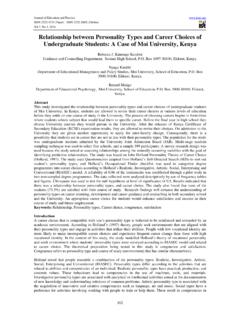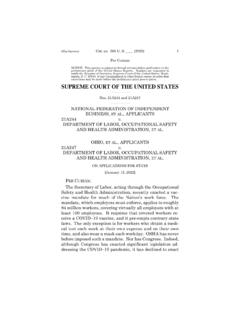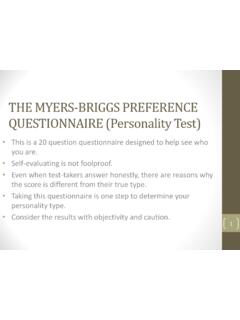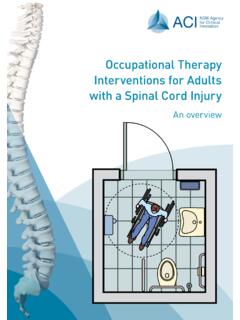Transcription of The Perceived Realism of African American Portrayals on ...
1 The Howard Journal of Communications, 19:241 257, 2008. Copyright # Taylor & Francis Group, LLC. ISSN: 1064-6175 print/1096-4649 online DOI: The Perceived Realism of African American Portrayals on Television NARISSRA M. PUNYANUNT-CARTER. Department of Communication Studies, Texas Tech University, Lubbock, Texas, USA. Based on questionnaire responses from 412 undergraduate students, this study sought to examine specific perceptions ( , occupational roles, negative personality characteristics, low achieving status, and positive stereotypes) of African American Portrayals on television.
2 Results revealed that television viewers perceive the occupational roles and personality characteristics that African Americans portray on television as real or true to life. On the contrary, viewers do not perceive the low-achieving roles and positive stereotypes of African Americans on television as realistic or accurate. These findings support past research that suggests that television can affect the way viewers think about African Americans in general. KEYTERMS African American Portrayals , occupational roles, stereotype, television For years, the media have been criticized for their representations of African Americans on television (Corea, 1993; Dates, 1990; Mastro & Tropp, 2004.)
3 Stroman, Merritt, & Matabane, 1989). In general, the literature suggests that, although the quantity of African American images on television has increased, the quality of these images has not (Greenberg, Mastro, & Brand, 2002; Mastro & Troop, 2004; Weigel, Kim, & Frost, 1995). Communication research and theory suggest that the mass media are an important source of information about African Americans and media Portrayals contribute to public perceptions of African Americans (Davis & Gandy, 1999;. Gray, 1989; Matabane, 1988; Wilson, Gutierrez, & Chao, 2003). Dates (1990), for example, has argued that Black images on television may cause viewers to conceive, alter, or even reinforce their beliefs and opinions about Blacks.
4 Address correspondence to Dr. Narissra M. Punyanunt-Carter, Department of Communi- cation Studies, Texas Tech University, Box 43083, Lubbock, TX 79409-3083. E-mail: 241. 242 N. M. Punyanunt-Carter Research findings using college students' perceptions have consistently shown that negative exposure to African American Portrayals in the media significantly influences the evaluations of African Americans in general (Ford, 1997; Mastro, & Tropp, 2004; Power, Murphy, & Coover, 1996). Other res- earch has shown that Black depictions on television have an effect on view- ers of all ages and of all races (Bryant & Zillmann, 1994; Dates, 1980).
5 Several media researchers have expressed concerned about the effects of negative African American Portrayals on television audiences (Daniels, 2000;. Rada, 2000; Stroman, 1984). Yet, little attention has looked at television audi- ence members' Perceived Realism judgments about specific characteristics of African American Portrayals on television and the effects of these images. Thus, the present study sought to examine specific Realism perceptions con- cerning occupational roles, personality characteristics, low achieving status, and positive stereotypes of African American Portrayals on television.
6 African - American Portrayals ON TELEVISION. Research on media Portrayals of African Americans has found that African Americans have been frequently portrayed in stereotypical occupational roles (Seggar & Wheeler, 1973; Warren, 1988), with negative personality characteristics (Cosby, 1994), as low achievers (Bramlett-Solomon & Farwell, 1996; Seggar & Wheeler, 1973) and with positive stereotypes (Donagher, Poulos, Liebert, & Davidson, 1975; Gunter, 1998). occupational Roles After reviewing numerous television shows, Seggar and Wheeler (1973) found that African Americans on these programs were generally depicted in service or blue-collar occupations, such as a house cleaner or a postal worker.
7 Similarly, in an extensive review of Blacks in the media, Warren (1988) found that the media often portrayed African Americans in occupational roles, such as a servant, a crook, a cook, an entertainer, a musician, a sad non-White person, an exhibitionist, an athlete, or a corrupt individual. Moreover, he affirmed that most stereotypes about Blacks are intensified by television Portrayals . Likewise, Baptista-Fernandez and Greenberg (1980) discovered that African Americans on television were seldom depicted as having a highly recognizable occupation or a professional or supervisory position in compari- son to White television characters.
8 Negative personality Characteristics African Americans are frequently portrayed with personality characteristics that are stereotypically negative. In one of the earliest examinations of African American Portrayals on Television 243. African American Portrayals , the Commission on Civil Rights (1977). found that African American television Portrayals typically depicted the following stereotypic personality characteristics: inferior, stupid, comical, immoral, and dishonest. Dates (1990) later noted that other stereotypes of African Americans existed, including disrespectful, violent, greedy, ignorant, and power-driven.
9 After determining that Blacks in the media tended to be portrayed as menacing, untidy, rebellious, disrespectful, buffoonish, sexual, immoral, hopeless, untrained, uneducated, and noisy, Cosby (1994) con- cluded that most roles Blacks portrayed were negative and stereotypical. Low Achieving Status In contrast to White characters, research indicates that that African Americans have lower socioeconomic status (SES) roles on television than Anglo Americans (Segger & Wheeler, 1973). Reid (1979) noted substantial differ- ences between Black and White female television characters; Black females were typically Perceived as low achievers and White females were typically Perceived as less dominant than Black female counterparts.
10 She also discov- ered that the viewers' perception of a White character on a Black program, such as The Jeffersons was not positive. Reid argued that such perceptions regarding Black and White females are due to the stereotypic images that are portrayed on television. Likewise, Greenberg and Brand (1994) found that African Americans on television typically had lower status roles and were depicted as having lower educational levels than Whites. Positive Stereotypes Not all studies dealing with Black Portrayals in the media have been stereo- typic. Performing a content analysis of 139 television series, Donagher et al.








